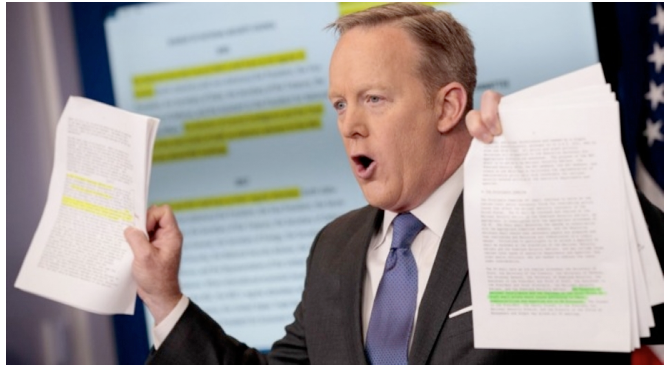CommentsANXIETY CENTRTAL--Americans have been taking to the streets in record numbers since the inauguration of President Donald Trump, but amid that uptick in resistance something else has been rising within the U.S. electorate: personal anxiety and stress caused by the nation's new political reality. (Photo above: White House press secretary Sean Spicer.)
According to a new survey by the American Psychological Association (APA), 66 percent of respondents report feeling increasingly stressed out by the current political climate and prospects for the nation's future.
The APA findings—contained in their Stress In America: Coping With Change (pdf) report—reveal that 57 percent of those surveyed said that politics have become either a "very" or "somewhat" significant source of anxiety in their lives. Meanwhile, 49 percent of those questioned said the outcome of the 2016 election, in which Trump was elected president and the Republican Party kept control of both the House and Senate, has become a specific source of new stress.
On these questions, the divide unsurprisingly broke along partisan and ideological lines. "While Democrats were more likely than Republicans (72 percent vs. 26 percent) to report the outcome of the 2016 presidential election as a significant source of stress, a majority of Republicans (59 percent) said the future of our nation was a significant source of stress for them, compared to 76 percent of Democrats," the report notes.
Vaile Wright, a licensed psychologist and member of APA's Stress in America team, speaking with the Washington Post, admitted the severity of the findings caught her off guard.
"The fact that two-thirds of Americans are saying the future of the nation is causing them stress, it is a startling number," Wright told the Post. "It seems to suggest that what people thought would happen, that there would be relief [after the election] did not occur, and instead since the election, stress has increased. And not only did overall stress increase, what we found in January is the highest significant increase in stress in 10 years. That's stunning."
Prior to its 2016 poll, the APA explained, "top stressors for the American population remained steady, with Americans being most likely to report money, work, and the economy as very or somewhat significant sources of stress in their lives."
However, as the election took center stage in the spring of 2016, APA's member psychologists began reporting that their patients were increasingly concerned and anxious about the political climate. It was this trend that spurred the group to make specific inquiries about how national politics were impacting stress levels for Americans.
While the group conducted surveys and collected data last year during the campaign and after the election, it was a new round of questions posed to Americans last month, subsequent to Trump's taking office, that fueled the latest findings.
"From the appointees to the executive orders to the laws that have just been proposed ... it's hard for me to see a bright future for my family, which in turn causes me a great amount of stress," Bryanna Zoltowski, a 40-year-old mother of two from Macomb Township in Michigan told the Detroit Free Press.
"I'm afraid," Zoltowski said. "I really am afraid. I'm scared for the future of my kids."
Are you feeling stressed? Earlier this month, the Huffington Post reported on 10 things therapists and psychologists recommend when it comes to de-stressing around politics.
(Jon Queally writes for Common Dreams … where this report was first posted.)
-cw
Sidebar
Our mission is to promote and facilitate civic engagement and neighborhood empowerment, and to hold area government and its politicians accountable.

 CityWatch Los Angeles
Politics. Perspective. Participation.
CityWatch Los Angeles
Politics. Perspective. Participation.
14
Sat, Feb















